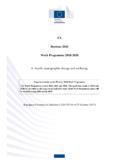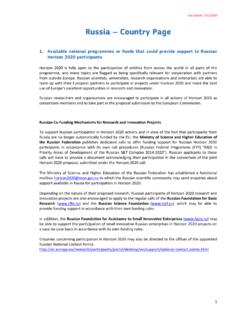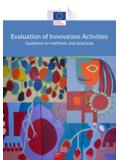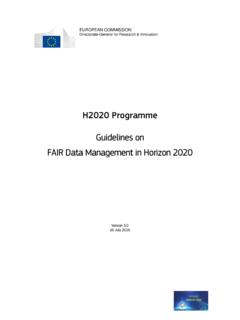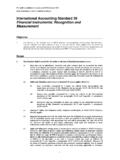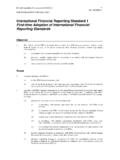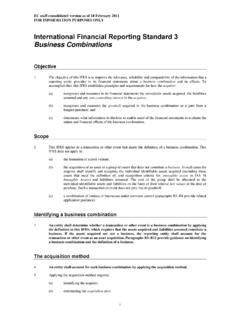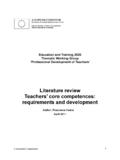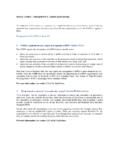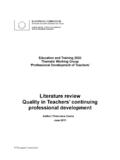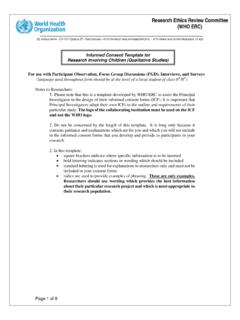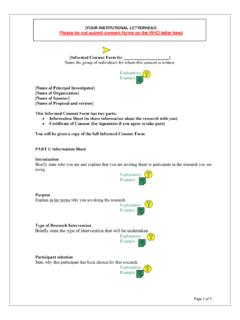Transcription of Guidance How to complete your ethics self …
1 EUROPEAN COMMISSION Directorate-General for Research & Innovation Horizon 2020 Programme Guidance How to complete your ethics self-assessment Version 21 February 2018 PP documents: Horizon 2020 Guidance How to complete your ethics self-assessment: IMPORTANT NOTICE These guidelines are designed to help applicants in getting your proposal ethics -ready for Horizon 2020 funding ( to identify and deal correctly with any ethics issues that may arise from it). They provide help both with the ethics issues table in Part A and the ethics self-assessment in Part B of your proposal (see the proposal templates on the Participant Portal). This document is however no more than a how to guide. It covers most of the ethics issues arising in research projects and gives advice on dealing with classic cases. Cases that are not covered must therefore be dealt with outside this guide.
2 The ethics self-assessment will become part of your grant agreement (in Annex 1, as description of the action, ethics requirements, etc.) and may thus give rise to binding obligations that may later on be checked through ethics checks, reviews and audits. This means the time you invest in this self-assessment is not wasted. It will actually improve your research results and: your proposed research will be in line with applicable international, EU and national law your proposal will be processed more easily during the Horizon 2020 proposal selection procedure the results of your research can be published more easily in internationally refereed journals you will contribute to the responsible conduct of research, thereby increasing its social acceptance. Consider that ethics issues arise in many areas of research. Apart from the obvious example, the medical field, research protocols in social sciences, ethnography, psychology, environmental studies, security research, etc.
3 May involve the voluntary participation of research subjects and the collection of data that might be considered as personal. You must protect your volunteers, yourself and your researcher colleagues. Start thinking about ethics while designing your research protocols. Don't wait until the last minute to seek advice or check requirements under national and EU law. ethics also matter for scholarly publication. Major scientific journals in many areas will increasingly require ethics committee approval before publishing research articles. Thus, you should be prepared for ethics procedures even if your research is funded by sources other than Horizon 2020. Your first source should always be at your institution. We would ask you to seek advice from colleagues with expertise in the ethics of research, such as: specialised ethics departments relevant managers in your university/research organisation hospital research ethics committees ethics advisers in your company data protection officers.
4 They will be able to provide you with information appropriate to your specific needs and legal environment. Consider involving/appointing an ethics adviser/advisory board. From the beginning of your project, an ethics adviser can help you deal with ethical issues and put in place the procedures to handle them appropriately. If your research includes several ethical concerns or involves several significant or complex ethical issues (such as participation of children from developing countries, non-human primates (NHPs) , potential misuse or vulnerable populations) we suggest you appoint an ethics adviser or an ethics advisory board comprising several experts from different backgrounds. The Commission/Agency may also make this an ethics requirement during the selection procedure. Other information For a broader overview of how Horizon 2020 grants work, see the Online Manual.
5 For detailed information, see the Horizon 2020 AGA Annotated Grant Agreement. A comprehensive list of all Horizon 2020 reference documents (including legislation, work programme and templates) can be found on the Participant Portal Reference documents page. PP documents: Horizon 2020 Guidance How to complete your ethics self-assessment: 1 HISTORY OF CHANGES Version Publication Date Change Document revised by DGT editors Reparation of hyperlinks Reference to new data protection Regulation Adapt instructions on providing of documents to new MGA provisions. Insert link to new Guidance note on research on refugees, asylum seekers and migrants Correction in ethics issues table in section H2020 is written as Horizon 2020 throughout the document. PP documents: Horizon 2020 Guidance How to complete your ethics self-assessment: 2 TABLE OF CONTENTS 1.
6 Human embryos & foetuses .. 3 2. Human beings .. 6 3. Human cells or tissues .. 11 4. Personal data .. 15 5. Animals .. 20 6. Non-EU countries .. 23 7. Environment, health & safety .. 27 8. Dual use .. 31 9. Exclusive focus on civil applications .. 33 10. Potential misuse of research results .. 35 11. Other ethics issues .. 38 PP documents: Horizon 2020 Guidance How to complete your ethics self-assessment: 3 1. Human embryos & foetuses This section covers research on human embryos and foetuses (mainly human embryonic stem cells (hESC)). The following fields of research are not eligible for funding under Horizon 2020 and cannot therefore be included in proposals): research activities directed at human cloning for reproductive purposes research activity intended to modify the genetic make-up of human beings that could make such changes heritable (apart from research relating to cancer treatment of the gonads, which may be financed) research activities intended to create human embryos solely for the purposes of research or stem cell procurement, including the technique of somatic cell nuclear transfer1 research that leads to the destruction of human embryos.
7 Research on human stem cells (both adult and embryonic) may be financed depending on both the content of the scientific proposal and the laws of the Member States involved. No funding will be granted for research activities that are prohibited in all Member States. No activity will be funded in a Member State where such activity is ethics issues checklist Section 1: HUMAN EMBRYOS/ FOETUSES YES/NO Page Information to be provided Documents to be provided/kept on file Does your research involve Human Embryonic Stem Cells (hESCs)? If YES: - Will they be directly derived from embryos within this project? Research not eligible for funding Research not eligible for funding - Are they previously established cells lines? Origin and line of cells. Details of licensing and control measures by the competent authorities of the Member States involved.
8 Copies of ethics Approval. A statement that the human embryonic stem cell lines used in the project are registered in the European hESC registry ( ) both for hESCs and human-induced pluripotent stem cell (hiPSC) lines. A statement confirming that the 6 specific conditions (see 1 See Article 19(3) of the Horizon 2020 Framework Programme Regulation (EU) No 1291/2013. 2 See also Article 19(4) of the Horizon 2020 Framework Programme Regulation (EU) No 1291/2013. PP documents: Horizon 2020 Guidance How to complete your ethics self-assessment: 4 below) for research activities involving human embryonic stem cells are met. Does your research involve the use of human embryos? Origin of embryos. Details on recruitment, inclusion and exclusion criteria and informed consent procedures.
9 Confirm that informed consent has been obtained. Copies of ethics approval. informed consent Forms + Information Sheets. If YES: - Will the research lead to their destruction? Research not eligible for funding Research not eligible for funding Does your research involve the use of human foetal tissues / cells? Origin of human foetal tissues/cells. Details on informed consent procedures. Confirm that informed consent has been obtained. Copies of ethics approval. informed consent Forms + Information Sheets. How do I deal with the issues? Your research must comply with: ethical principles applicable international, EU and national law (in particular, the Statement of the Commission related to research activities involving human embryonic stem cells3). For research activities involving human embryonic stem cells (hESC), this means you must make sure that: cells were NOT derived from embryos specially created for research or by somatic cell nuclear transfer the project uses existing cultured cell lines only cell lines were derived from supernumerary non-implanted embryos resulting from in vitro fertilisation informed consent has been obtained for using donated embryos for the derivation of the cell lines personal data and privacy of donors of embryos for the derivation of the cells are protected NO financial inducements were provided for the donation of embryos used for derivation of the cell lines.
10 3 See Article 19(1) of the Horizon 2020 Framework Programme Regulation (EU) No 1291/2013. PP documents: Horizon 2020 Guidance How to complete your ethics self-assessment: 5 Moreover, under national law, research on human embryonic stem cells (hESC) is normally subject to strict licensing and You must provide the Commission/Agency with a statement confirming compliance with these conditions (as part of your proposal). For research on human embryos (hE), you must obtain the donors free and fully informed consent . Your research may NOT: create human embryos solely for the purpose of research or for the purpose of stem cell procurement (including by means of somatic cell nuclear transfer) destroy human embryos ( to obtain stem cells). What do you need to provide? If your proposal raises one of the issues listed in the ethics issue checklist above, you must complete the ethics self-assessment in Part B of your proposal ( section 5 of the Technical Annex).
